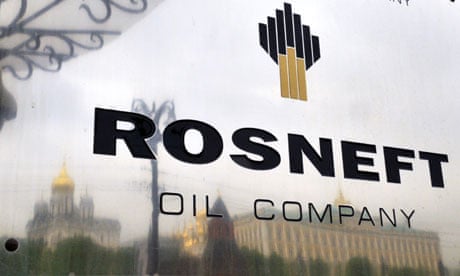The Russian oil and gas group Rosneft is ready to ditch BP and look elsewhere for an alliance with a foreign competitor following the collapse of the two companies' proposed alliance.
The Rosneft-BP deal, announced in January, would have paved the way for joint exploration of parts of the Arctic where there may be 60bn barrels of oil in an area the size of the North Sea. Its collapse is a severe blow for the British firm's chief executive, Bob Dudley.
Dudley's move was viewed as a way for BP to ensure long term growth and revive its reputation after the explosion on its Deepwater Horizon rig in the Gulf of Mexico last year, leading to the worst oil spill in US history. The disaster off the coast of Louisiana has cost BP more than $41bn (£25bn) and has forced it to sell assets to raise $24bn.
The Russian deal, which also involved a $16bn share swap between BP and Rosneft, is in tatters after Dudley failed to overcome legal opposition from AAR, a consortium of Russian billionaires that is the British company's existing partner in the country.
Rosneft refused to extend a deadline of midnight on Tuesday for the dispute to be settled. Sources close to the Moscow-based company said it was seeking an Arctic alliance with one of BP's rivals, which include Shell, US companies ExxonMobil and Chevron, and Total of France.
One of BP's City shareholders said: "The collapse of BP's pact with Rosneft will be a serious disappointment for Dudley as it was the only deal on the table that offered the prospect of future production on a grand scale."
Despite the breakdown of the alliance between BP and Rosneft, as well as the ending of negotiations with AAR, all three parties held out hope that an agreement could still be reached.
"Talks will continue in the days ahead, and it's possible that something can be salvaged," said one source. A senior oil executive said: "Don't exaggerate what has happened, I'm not sure this is the end of the story."
Rosneft's deputy chairman Andrey Kostin was reported as saying he thought there may be scope for an accord after meetings scheduled in the days ahead. But most analysts said the agreement that had been envisaged in January appeared "dead in the water".
BP said it had tried to break the deadlock but that "a solution has not been found at this time, although talks continue".
The oligarchs behind AAR had blocked the Rosneft/BP alliance in the courts on the basis that it breached a shareholder agreement that provided for TNK-BP, the name of AAR's joint venture with BP, to have pre-emption rights on any business opportunities in Russia.
The various parties had reached an agreement that would have allowed BP and Rosneft to buy out AAR's oligarchs, led by Mikhail Fridman, for $32bn.
But Rosneft was reluctant to sign a binding agreement. For its part, AAR balked at signing an agreement to sell to BP and Rosneft unless the sale was also underpinned by a three-way oil and gas exploration alliance. A source close to the talks said: "These were complex negotiations and in the end, there wasn't enough time to clinch an agreement."
Without a deal Rosneft decided to pull out of the pact with BP and look for new partners. Sources close to Rosneft accused the oligarchs of making "unacceptable demands".
But Fridman struck a conciliatory tone: "AAR sees significant benefit to developing co-operation with Rosneft within the framework of the TNK-BP shareholder agreement."
It is thought the AAR partners are keen to get Arctic exposure since the joint venture with BP has limited growth prospects owing to a mainly mature onshore portfolio.
The failure to shore up the deal to explore the Arctic's oil-rich Kara Sea is an embarrassing setback for Dudley. His idea was to cement BP's move forward from the Gulf spill and show it no longer needed to rely so heavily on the United States, where it is still barred from drilling in the Gulf. Dudley, who took over from gaffe-prone Tony Hayward, had proclaimed the deal "historic" and "groundbreaking".

Comments (…)
Sign in or create your Guardian account to join the discussion